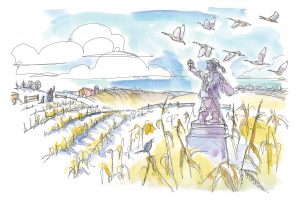True confessions from the 9th Concession
by Dan Needles
illustration by Shelagh Armstrong-Hodgson
There is a legend among historians that Samuel de Champlain, the great mapmaker, explorer and arguably the first “Canadian,” spent the winter of 1615 on my farm in Huronia, the land of the tobacco-growing Petun Nation. I say a legend because it appears the great mapmaker was pretty much lost the whole time after he paddled up the Lachine Rapids into the Great Lakes. Some say it’s also possible he spent that winter near Peterborough, Ontario, or the Finger Lakes district of New York State. They’re not quite sure. Champlain himself was quite certain China was just over the next hill.
That’s what I love about history. You reap such handsome returns in conjecture for just a trifling investment of fact. I like the Huronia winter version because it places the old boy right next door to me and makes him a neighbour.
There was something totally manic about Champlain. He crossed the Atlantic some 27 times without losing a shipmate. During one storm, the captain lost his nerve and Champlain took the helm, safely steering the ship onto some soft rocks and supervising the evacuation of the ship. No injuries were reported. He explored what would become six provinces and five states, and founded the first post-Columbian European settlement in Canada. He did it on a wing and a prayer with other people’s money and never found anything an explorer of that day was supposed to find: no China, no spices, no Northwest Passage, Fountain of Youth, gold or even an effective weight loss diet.
His most important concept was his use of the word Métis, a French word that means mixed, which is what he thought we should all be if we had any hope of living in peace. Four hundred years later, I think he would be very pleased to see how mixed Canada has become.
I look out my office window at the cornfield that hosted the village of Etharita and I think of Champlain resting on a pile of beaver pelts in a longhouse, telling lies and smoking the winter away as a guest of the Petun. The natives obviously enjoyed his company and handed him around like a pet turtle for about 20 years. They taught him to live off the land, and he suggested they stop sleeping on the ground, a simple innovation that doubled the lifespan of anyone he met.
It’s true he did start a war with the Iroquois, but his mistake was bringing firearms to the semifinals of the lacrosse season. The result was tragic and set his Métis idea back by a century. He regretted his mistake profoundly.
Today my field rotates between crops of corn and soybeans. In Champlain’s day it was corn, beans and squash all planted together in little hills, a concept the Indigenous people called The Three Sisters. Sam talked about how easy it was to get turned around in the cornfields of the Petun, a significant admission from a man who was uncertain of his location pretty much from the day he stepped off his veranda in Brouage, France. Nothing changed for him and when he died in 1635 his gravesite was promptly lost. In death as in life, his whereabouts are uncertain.
There’s something about winter in the country that brings a person to heel and reduces life to simpler terms. E.B. White insisted it was a full-time occupation staying warm, fed and amused, and it must have been a special kind of torture for a spirit as restless as Champlain’s. Or maybe it wasn’t. He may have been happy to gather calories and rest up for the spring runoff.
There is a dramatic statue of him behind the National Gallery in Ottawa, holding his astrolabe aloft and sighting his position. He’s holding the thing upside down, which is not surprising because he probably didn’t have much use for it. I like to think the statue captures him heaving the thing into the bush and telling his Indigenous friends to take him wherever the hell they wanted. He was in no rush to get anywhere and was looking forward to the trip.
As the snow retreats to my fencerows and a warm gust rattles last year’s corn stalks, I imagine the great man scanning the skies for returning geese and packing his kit for the next adventure. It was nice to have him here. I enjoyed his company and his talk of courts and kings, the vast forests, high-flowing rivers and rough seas that lay between us and his home. It sure made spring come faster.
I hope he comes back to us some day. ❧
Author and playwright Dan Needles is the recipient of the Stephen Leacock Medal for Humour. His latest book, True Confessions from the Ninth Concession (Douglas & McIntyre), is a collection from 20 years of his columns for On The Bay and other publications.












